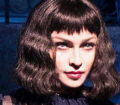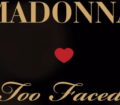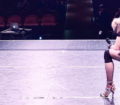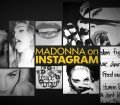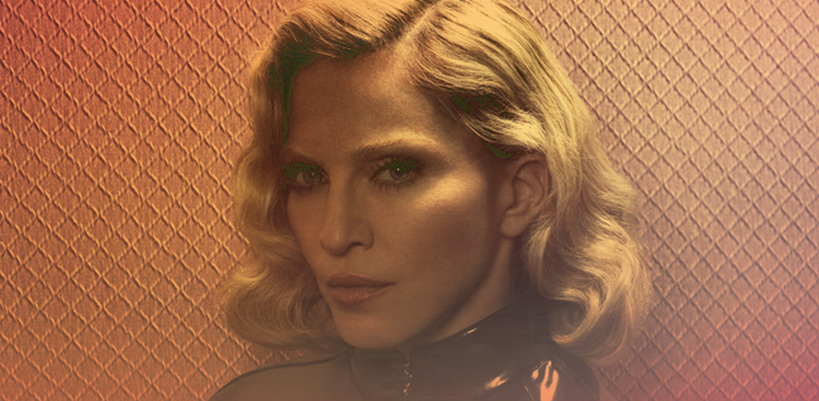
Madonna was tired but cheerful when she sat down in her Manhattan mansion for her Rolling Stone cover-story interview, just after the Grammys in February. She gave a mini-tour of a small portion of her house, pointing out the Debbie Harry and David Bowie photos in her elevator (“nobody in their 20s knows who that is”), the one-of-a-kind collage the late Keith Haring made for her and many photos by her friend Steven Klein. In the interview itself, she discussed ageism, Lady Gaga, Kanye West and much more — but there was even more that didn’t make the print edition.
Here’s the best of the rest, including a look at the creative process behind her new album, Rebel Heart.
Rolling Stone: I enjoyed the Grammys performance — and watching the rehearsals as well.
Madonna: It’s a process, yeah. I enjoyed the rehearsals more than the performance.Rolling Stone: Really?
Madonna: I enjoy the process of everything more than the pressure of the finished product. It’s like everything. When I go on tour, I like the rehearsal. I like the creation of everything. like being able to wear my rehearsal clothes and be sweaty and not having to worry about how I look and just get into what it is I’m trying to say and do. Same with making music.You know, the process is obviously much more liberating than delivering something for the world to judge. [Laughs] Because then you have to say, “This is the final thing.” But actually, it’s never the final thing. You wish you could do it again, or tweak it just a little bit more, or change things. Well, that’s what art is. So I enjoyed the Grammys. But after I did it, I wanted to do it again, only better. [Laughs] And of course, my experience of it is not what everybody else is experiencing. And then you have the TV aspect of it, which is, who knows what they filmed?
Rolling Stone: And it’s not under your control.
Madonna: Live TV is one of the most stressful things ever. When you do your live shows, you have two hours, so if you make a mistake, it’s OK. You move on, you have 20 other songs to do. And that whole audience is there to see you anyway. But when you do an awards show, it’s not your audience. You have five minutes or less, and it’s like, do you play to the crowd? Do you play to the cameras? It’s kind of a mindfuck.Rolling Stone: Does the process of planning these small performance start your thinking about the tour?
Madonna: I mean, when I make the music, sometimes I get fleeting moments of ideas of what I would do live. But it’s not until I start doing my promo shows that I start going, “Oh, I’m going to elaborate on this theme or this persona.” I like to create personas and then the persona changes and grows into other things. So, again, process. I’m at the beginning of that process right now, in terms of thinking of my tour and stuff.Rolling Stone: How does that process actually work?
Madonna: Well, it doesn’t just start the month before my rehearsals start. I’m gathering ideas all year long, whether that’s an art exhibit that I saw or a film that I saw or a show that I saw that inspired me, and I thought, “Oh, that’s an interesting way to use lights or to use music, or the shape of the stage, or. . .” I collect ideas from every world — art, fashion, music, all of it. Then these small performances start to get my juices flowing and the idea for the video became the catalyst for what I did at the Grammys, becomes the catalyst for what I do at the BRITs. It just starts spinning from there.Rolling Stone: You didn’t end up working with Disclosure, but “Living for Love” reminds me of them a little.
Madonna: They weren’t on my mind for that particular song, but obviously I love their stuff, and I wanted to work with them. And I met with them to work with them, and I played them some of my music. When I met them it was at Governor’s Ball, and they had such a busy schedule. I was in Europe, they weren’t there. When they were in New York, I wasn’t here. So we couldn’t hook up. And I had so many other moving parts, with Diplo and Kanye and Avicii, people with really busy schedules. So I couldn’t add one more problem to the equation. One more person that I was chasing. How many men can you chase? [Laughs] None! We don’t chase men. They chase us.Rolling Stone: I remember years ago you talking about how disorganized William Orbit was during Ray of Light.
Madonna: That seems to be my curse. I keep attracting extremely disorganized geniuses. Yeah.Rolling Stone: People often assume creative people are drawn to chaos, but you’re just the opposite. Incredibly disciplined, organized.
Madonna: Everybody’s process is different. Some people need to create an environment where it’s all stream of consciousness — they need to be high, they need to be drunk, they need to be surrounded by a posse, they need to have craziness around them — to create. And other people need peace and quiet and not a lot of distraction and the ability to focus. I’m more like that. But I think I’m pretty balanced with the left and right sides of my brain. I would say I’m as organized as I am creative. I don’t do really well with crowds and chaos and people coming in and out of the room. Other people seem to be fine with it, but I can’t handle it.Rolling Stone: How do you physically write your lyrics? Do you sit and type them somewhere?
Madonna: Yeah. That’s why I like peace and quiet, because to write lyrics, you have to sit there. I mean, I used to handwrite everything, but now I put everything in the computer, and I just sit there with my little laptop on my lap and write things. You know this, when you write and you see the words, it it has a different effect on you than if it’s in your head. You see it, and then you sing it or you bounce it off other people’s brains, and you get into the poetry of it, the rhythm of it, the flow of it.Rolling Stone: And you had a lot of new people around you this time.
Madonna: With this particular record, I put myself in a funny position. Because usually I choose a producer to work with, or two, and then I write and produce everything with those people. The whole thing is just done within this little bubble. Whereas this situation was me working with a lot of writers that I’d never met before in my life — literally walking into rooms and sitting down and saying, “OK, let’s write a song.” Total strangers.And some people I connected to immediately like [“Wrecking Ball” co-writer] Mozella, for instance, or [“If I Were a Boy” co-writer] Toby Gad. They’re very open-hearted people, extremely musical, not inhibited in any way, shape, or form. So they were fun. And then there were other people that were really shy, and I think maybe slightly intimidated by me. I was constantly putting myself in these, like, very awkward situations, to me it was an exercise in letting go, to sit with people I’d never met with before.
Rolling Stone: How did that affect the songs?
Madonna: With songwriting, you have to make yourself open to people and vulnerable to people, especially if you’re writing about something personal or a sensitive subject, something close to your heart. And you’re doing it with someone you’ve never met before. It’s kind it’s like that exercise where you stand with your eyes closed and you let yourself fall back, and you just, like, trust that someone is going to catch you. So I would say that a lot of working on this record was like that.Rolling Stone: How did you grapple with the chaos of it all?
Madonna: I prefer order, and I prefer to know what I’m getting every day and what I’m showing up to. I like it when the people I’m working with come to work — just them, and not their entire families or 20 of their closest friends. You know what I mean? But there’s a lot of that going on, and I find it a little bit distracting. That’s hard for me. I’m old school. Kanye wasn’t really one of those people that had lots of people come in the room, but he himself is chaotic. So I’ve been lucky to work with a lot of madmen, and charming [people]. Thank God they’re charming, because otherwise they wouldn’t get away with the things they do. [Laughs] So yeah. I mean, honestly, I don’t know how people finish anything after what I’ve witnessed. [Laughs] Seriously!Rolling Stone: Do you think work habits have devolved?
Madonna: I think there’s a lot of distractions now. I think people are really, supremely distracted, and everyone feels the obligation to be very involved with social networking. So a lot of the time of the day is spent doing that. There’s a lot of people leaving to go to red carpet events or to tweet. Like, having to go out and do fast interviews or, like, go on Twitter and do this or that. I was just like, “Wow,” you know? My head was spinning. But that’s the world we live in, now. The age of distraction.Rolling Stone: Björk said something interesting recently, which is that she feels that any time that any man is in the studio with her, he ends with all the credit for the music. Can you relate?
Madonna: Oh. I don’t know. Actually, I haven’t thought about that. I have too many other axes to grind. [Laughs] But there have been moments where people were like, “And that was produced by Diplo, right?” And I’m like, “And me. Yes, both of us. We did it all together. Yeah.”Rolling Stone: By the way, Drake just dropped a song with your name in it.
Madonna: Yes, I know. I read the lyrics but I haven’t heard it. In fact, as soon as I hang up I’m going to check it out. Is it good? I hope so.Rolling Stone: It’s a nice little show of respect, even if he’s hitting on a girl by promising he’ll make her as big as Madonna.
Madonna: Yeah, I think it’s a good pickup line. Right?Rolling Stone: You were working on a screenplay at the same time as the album, weren’t you?
Madonna: I adapted a book into a novel, The Impossible Lives of Greta Wells. You should read the book, it’s really good. I actually thought I was going to direct a film next, so I started writing the screenplay. And then I started writing music, and then I would kind of go back and forth between writing a script and writing music. And then I thought, “Well, I don’t know what I’m going to do next. May the best man win.” So it was sort of like, I finished the script, and I was almost finished with my record. And I met with some [movie] producers and I started thinking about the script. And I started thinking about, the casting process, and getting it financed. And then I just felt more drawn to my music, aso that ended up being the winning man, the winning horse. For now. But I’m going to make my film, that’s also very important to me. And there are things in my script, in the writing of my script, that actually influenced my music and lyrics and ideas. Stories, things like that.Rolling Stone: There’s a song called “Joan of Arc” on the new album — she’s a historical figure you’ve long admired.
Madonna: I’ve always been drawn to her story. More than anything, drawn to her commitment to what she believed in. In the face of death, she did not back down. And that is a theme that resonates with me. And women need female role models like that. There’s not a lot. I mean, she was burned at the stake after leading her country to victory, after defeating the English. I mean, the idea that instead of celebrating her, they called her a heretic because she was dressed like a boy, and how could this person, this one girl, be so victorious and so clever to have the strategy and knowledge to wage, and win, a war? There must be something wrong with her. OK, she’s a witch. Now we have to destroy her. And she didn’t back down, and I admire that.Rolling Stone: But in the lyrics you say you’re not her, not yet.
Madonna: Meaning, I’m not ready to be burned at the stake. Not yet. That does really require an elevated soul, you know? When you are really, really ready to die for what you believe in. I mean, obviously people like Martin Luther King Jr., they’re extremely inspiring to somebody like me. Because, obviously, he was told time and time again, “If you keep doing this, you’re going to keep getting arrested. There’s a lot of people who want to kill you.” He understood that this was his journey, this was his destiny. And it’s just that there’s not a lot of women like that.Rolling Stone: What cause would you be willing to. . .
Madonna: What would I be willing to die for?Rolling Stone: Only because you’re talking about how you’re not there yet.
Madonna: I would die for my children. For sure. But, you know, the whole thing that happened to Malala [Yousafzai] for instance, that she was shot with the intent to kill because she was going to school, or was promoting education through her blog or whatever. That really makes me want to start a war. I don’t know who I’d be fighting, but do you know what I mean? The idea that a girl can’t have an education is unspeakable, to me. But all forms of discrimination drive me crazy. If you’ve seen my film secretprojectrevolution, it’ll help you understand. It’s really important. But when I was on tour, all these things were happening, with Pussy Riot, Malala being shot at, you know, gays being arrested for being gay in Russia. There were so many crazy things happening in the world at the time, like, the growing fascist movement that I perceived, that I witnessed while I was in Europe. All of these crazy things were happening, and it really freaked me out.Rolling Stone: What did you make of it all?
Madonna: I felt like we were really going backwards, humanity was going backwards. And I felt like I was witnessing the collapse of civilization as we know it. And now, you know, with all of the things that have happened here in America, what happened in Paris, what’s happening around the world with Boko Haram, there’s a lot of causes that get me going and that make me think, you know, “Let’s go. I’m ready to fight for all these people, for all people who are discriminated against for their religion that they choose, their sexual preference.” All of these things. I really can’t take it. I feel personally wounded by it, and I feel like it’s my job as a human being, as an artist, as a mother, as a woman, to fight for all these people.
Source: Rolling Stone
Madame X is available in Box Set, CD, Vinyl and Cassette!
Get your copy HERE!
